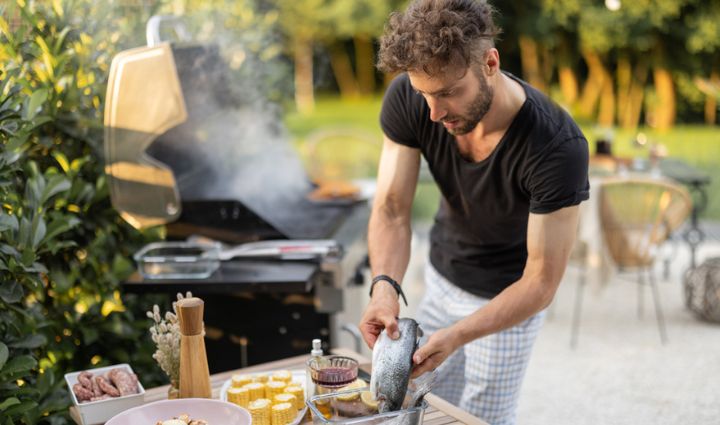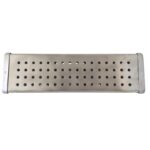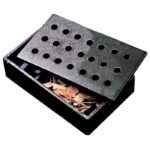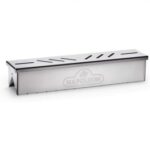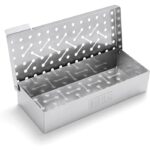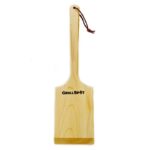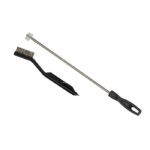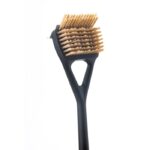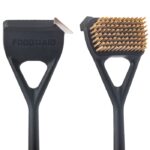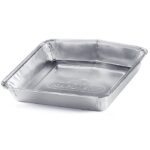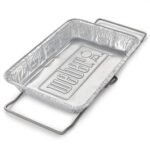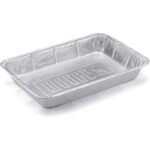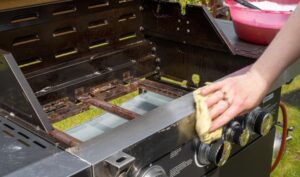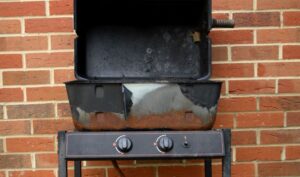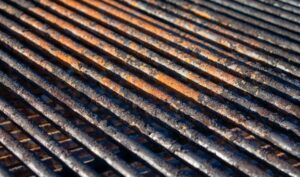The Complete Guide to Troubleshooting Gas Grill Issues is your source for step-by-step instructions on how to diagnose and fix the most common gas grill issues. Whether your grill isn’t heating properly, won’t stay lit, or simply has rusty parts, we’ve got the answers you need to get your gas barbecue firing on all cylinders.
Smoked meat may be delicious, but if your grill is smoking when you don’t want it to, or it is smoking too much when you do want it to, it can frustrate the cooking process.
While there are some grilling scenarios where smoke is desirable—such as while smoking meat—most of the time, you don’t want there to be too much smoke (or any smoke at all) while you are grilling.
There are a few different reasons your BBQ may be producing too much smoke. In this section of the Complete Guide to Troubleshooting Gas Grill Issues, we’ll help you figure out how much smoke is too much when smoking meat, why your bbq is producing too much smoke even if you aren’t using it as a smoker, and how you can fix it. Keep reading to learn how to deal with:
- Not enough propane
- Grease or food residue
- Too much food on the grill
- Fatty foods
- The temperature is too high
- A bad mix of gas and oxygen
Let’s get started.
How Much Smoke Is Too Much When Smoking Meat Using a Smoker Box?
You can typically expect a lot of white smoke initially when smoking meat, whether in a smoker or on your grill, but it should die down after a few minutes. If you’re experiencing an excess of smoke well into the smoking process, this is an indication that something is wrong, such as:
- You may be using too much wood
- The vents may be blocked in the smoker box
- You didn’t pre-soak the wood chips in water for long enough
To use a smoker box properly, soak the wood chips in water for 30 minutes before you put them on the grill to prevent burning and excess smoke. Place your soaked wood chips in the smoker box, taking care not to overfill the box or block too many of the vents. Place the box on the burner and avoid raising the temperature too high.
When smoking your food, you want to go low and slow and keep in mind that the ideal grill temperature falls between 212 and 230 degrees. Higher temps may result in excess smoke.
Why Does My Grill Smoke So Much?
Read on to discover six reasons your BBQ makes too much smoke:
1. Grease or food residue buildup
The most common reason for unwanted smoke coming off your grill is grease or food buildup. Thankfully, the solution to this one is easy—though it may not be the one you want to hear: clean your grill.
- When the grill is cool, brush or scrape off any deposits that have built up on the underside of the lid.
- Brush the cooking grates using a grill cleaning brush to remove any leftover debris from your last cookout. A wood scraper can be used for very stuck-on stuff.
- Remove the cooking grates and clean the heat plates or heat tents.
- Remove the heat plates and clean the burner tube ports to remove any rust and debris. Brush across the length of the burner, not down. This will help prevent pushing any debris into the burner tube ports.
- Chip and scrape away any built-up debris or deposits along the sides and bottom of the burner box, pushing all the debris into the grease tray.
- Scrape debris from the grease tray into the drip pan and empty the drip pan.
Season your grill grates. No matter what type of grates you have, coat them with oil and heat the grill up for 10-15 minutes. Seasoning helps to prevent sticking, which results in residue buildup and smoking.
GRILL SPOT TIP: You can reduce the amount of stuck-on food you get by pre-heating your grill to the correct temperature before you place any food on the grates.
Learn more about how to clean your grill’s specific type of grates: How To Clean Your Grill’s Cooking Grates & When to Replace Them.
2. Not enough propane
Occasionally, low levels of propane can result in your grill producing more smoke than usual. Check your fuel gauge to see if your tank is low. If it is, refill or replace the tank.
3. Too much food on the grill
If your grill grates are jam-packed with items, there won’t be enough space for air to move properly through the grill. This can result in excess smoke, but all you need to do to solve the issue is reduce the amount of food on your grill—and maybe consider investing in a larger grill if you are cooking that much food.
4. Fatty or overly-marinated foods
When you’re grilling meat that is very fatty or heavily sauced, this can result in drippings falling through the grates and creating smoke. Avoid this by cutting off excess fatty parts, not over-marinating or oiling your food, and using a drip pan. A drip pan catches the drips and keeps them from hitting the burner, resulting in smoke.
5. The temperature is too high
The temperature at which you grill your food matters. Different fats or oils all have different smoke points (the temperature at which something begins to smoke and develop an undesirable bitter taste). Cook the food at the proper temperature and you’ll see a reduction in smoke and enjoy a more pleasant eating experience. If you’re not sure what temperature you should cook your food at, consult your cookbook or grill manual for guidance.
6. A bad mix of gas and oxygen
A bad mix of gas and oxygen in your grill is typically caused by one of two things: problems with the gas regulator or the air shutters on the burners. If you suspect the mix of gas and oxygen might be the issue, check your regulator and burner shutters using these instructions:
Check your regulator
Gas grills come with a safety feature called an Overfill Prevention Device (OPD), also known as an Flow Limiting Device (FLD). Accidentally triggering your gas grill’s OPD or having a malfunctioning regulator can impact the flow of gas and produce low or yellow flames, or smoke. Start by confirming your OPD hasn’t been triggered by following these steps:
How to reset your OPD
If the OPD detects an overfill of gas (i.e., a gas leak), it will go into bypass mode and immediately reduce the amount of gas passing into your grill.
There are a few things that can trigger bypass mode accidentally:
- Opening the tank valve too quickly.
- Turning the burners on before opening the propane tank.
- Turning the propane off before turning off the knobs.
- Leaving the control knobs turned on after grilling.
You can quickly reset your OPD and restore normal flow by following these steps:
- Open the grill lid.
- Turn off the gas at the propane tank.
- Disconnect the gas line from the tank.
- Turn all the control knobs up to high, including your side burner if you have one.
- Wait for one full minute, then turn all the control knobs off.
- Reconnect the gas line to the propane tank and slowly turn the gas on at the tank.
- Light your grill.
Replacing your regulator
If the problem still exists after resetting your OPD, your regulator may be malfunctioning. Inspect your regulator for cracks and other damage. If you notice that it is damaged, it should be replaced. Thankfully, replacing a regulator is simple:
- Pick up a new regulator that fits your gas grill.
- Ensure that you have the gas turned off.
- Remove the existing regulator—most simply twist off, but consult your manual if you aren’t sure or are having difficulty.
- Install the new regulator.
- Check for leaks using soapy water.
Check your shutters
If an improper mix of gas and oxygen is the culprit behind your smoky grill, you may just need to adjust the air shutters on the burners. Too much (or too little) air flow into your grill burners can impact temperature and result in smoke. If this is the problem, adjusting the shutters on your burners can improve the temperature accuracy and reduce smoking in your grill:
- Locate the venturi tube adjustment screw you’ll use to release the shutters or adjustment sleeve in step 3. If you need help finding it, consult your manual.
- Light the grill and set it on low.
- Loosen the screw and open the shutters till the flame is mostly blue.
- Repeat for other burners as needed.
- Turn off the gas and tighten the adjustment screw.
- Let your grill cool.
Conclusion
If your gas grill is smoking more than you want it to, it can make the whole grilling process unpleasant as well as impact how your food tastes. Thankfully, there are several easy solutions for reducing the amount of smoke you are experiencing:
- Adjust your smoker box setup
- Refill your propane
- Clean your grill
- Reduce the amount of food on the grates
- Cut back excessively fatty parts, reduce the amount of marinade, and use a drip pan
- Turn down the temperature
- Adjust your regulator or shutters
Learn more about different grill problems, what causes them, and how to solve them in our Complete Guide to Troubleshooting Gas Grill Issues:

